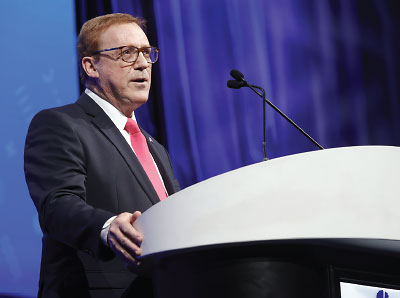Levin Praises Members for Dedication During Pandemic, Looks to APA’s Future
Abstract
APA’s CEO and medical director noted the contributions of members and former presidents to put APA in a stronger position to address the many challenges that psychiatry is facing.
“Many of you were forced to change your practices overnight and made significant sacrifices to ensure that your patients could continue their care.”
With those words, APA CEO and Medical Director Saul Levin, M.D., M.P.A., welcomed APA members and their guests to the first in-person Annual Meeting since before the start of the COVID-19 pandemic.

APA CEO and Medical Director Saul Levin, M.D., M.P.A., praised APA members for not missing a beat in terms of providing patient care during the pandemic.
“You made the profession of psychiatry stand tall and showed Americans the value of mental health care as the nation and the world grappled with depression, anxiety, PTSD, increased alcohol and substance use, as well as partner and family violence,” he said at the meeting’s Opening Session. “As we slowly emerge from the pandemic into the endemic phase, we must be ready as psychiatrists to help our communities address the marks it has left behind.” Levin also thanked members of the APA administration for their work throughout the pandemic—serving members and the Association as if there was no pandemic.
While psychiatry is faced with many challenges, he pointed out that they present new opportunities to make history. Chief among them is the comprehensive mental health plan of President Joe Biden. APA is working hard to see that this plan becomes reality so that more people with mental illness and substance use disorders have access to the care they need.
As an organization, Levin noted that APA is changing—the membership is becoming younger, more gender diverse, and more inclusive of members from minority and underrepresented groups. “As America grows and diversifies, so too must APA and the profession of psychiatry,” he said. “We must embrace and facilitate this change”—a change that will not only make APA stronger but also benefit patients of all backgrounds.
Levin gave particular recognition to APA’s recent presidents. He called the Task Force on Interprofessional Collaboration of Bruce Schwartz, M.D., “a forward-thinking effort that laid the groundwork for the partnerships we must form with other stakeholders in mental health.” Jeffrey Geller, M.D., M.P.H., appointed two task forces—one on psychiatric beds and another on addressing structural racism within APA and psychiatry—that provided a basis for taking vital action on two critical issues. (An article on the task force’s work on addressing the urgent need for psychiatric beds will appear in the August issue of Psychiatric News) Vivian Pender, M.D., brought much-needed attention to social determinants of mental health, serving as the theme for this year’s Annual Meeting.
“As long-time leaders and members, we are compelled to pay back our predecessors and help the new generation of members feel they belong in APA,” he concluded. “I will never forget the guidance and learning I experienced from my mentors when I was a resident and Leadership Fellow. The APA Foundation is committed to working with our leaders and our members to help provide a vehicle to mentorship.”
That vehicle is the new Advocate/Protégé Program. The goal of the program is to match “advocates” (mentors) with protégés (mentees) for the development of professional and personal relationships through in-person and virtual events and further the proteges’ leadership development and career.
“Let’s work together to ensure psychiatry’s bright future,” he said. ■



